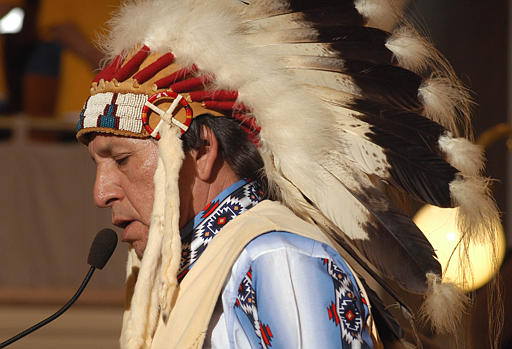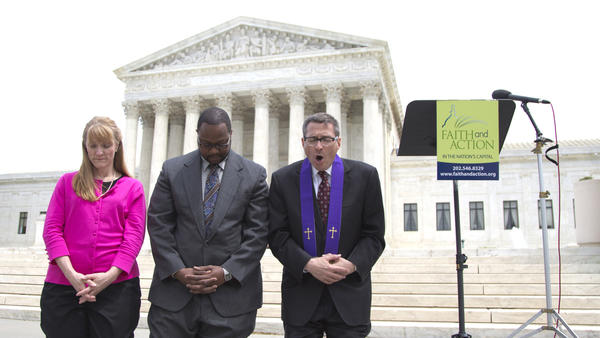Many Americans are religious and seek to incorporate religious observances, especially prayer, into public events. Whether such observances are permitted under the establishment clause of the First Amendment largely depends on the nature of the event. If the event is privately sponsored by a business or a club, for example, prayers can be offered without fear of violating the First Amendment. If the sponsor is a government organization, however, the First Amendment’s establishment clause comes into play. Even then, if a private citizen, without advance knowledge or prompting by the government, chooses to pray, there may be no First Amendment violation.
Courts sometimes uphold prayer at public events as an American “civil religion” tradition
Disputes arise when the government either has prompted prayer or is complicit in the decision to offer a prayer at a public, governmental meeting. In such cases, courts are more likely to uphold the religious practice when it occurs outside an elementary or secondary public school setting, viewing it as part of what is sometimes called the tradition of American “civil religion.”
The most notable example of such public religious expression is at the presidential inauguration when a distinguished member of the clergy — or sometimes even the president — offers a prayer. The Supreme Court weighed in on a similar issue in Marsh v. Chambers (1983), ruling in favor of government funding of chaplains.
In upholding Nebraska’s practice of opening its legislative sessions with prayer, the Court avoided relying on the three-part Lemon test that it often applies in establishment clause cases; instead, it ruled on the basis of history and tradition. This more permissive posture has also trickled down to the local government level. The Utah Supreme Court upheld a city council’s practice of allowing a variety of speakers to open its meetings with prayer or other inspirational messages in Society of Separationists v. Whitehead (1994).
Events where students are present get more scrutiny
Critical to these cases is that there is no “captive audience” whose presence is compelled by compulsory attendance laws, unlike in the school prayer decisions. Equally important, the audience is composed of adults as opposed to impressionable school children. The closer cases are to the school setting, the more likely it is that courts will interpret the establishment clause more strictly and disallow the religious practice. For example, the Sixth U.S. Circuit Court of Appeals ruled in Coles v. Cleveland Board of Education (1999) that a local school board, despite being a legislative-type body, could not open its meetings with prayer. The presence of students at school board meetings was key to the decision.
Court are more likely to uphold generic prayers
Another thread runs through many of these public prayer decisions. Courts are more likely to uphold “generic” prayers and more likely to strike down sectarian or “proselytizing” prayers. This trend has led some government officials to move toward neutral moments of silence as a means of solemnizing their public events; courts have generally upheld these at public school events as well.

Critical to these cases is that there is no “captive audience” whose presence is compelled by compulsory attendance laws, unlike in the school prayer decisions. Equally important, the audience is composed of adults as opposed to impressionable school children. The closer cases are to the school setting, the more likely it is that courts will interpret the establishment clause more strictly and disallow the religious practice. In this photo, Chief Alfred Red Cloud of Pine Ridge, a fifth generation descendant of Chief Red Cloud, delivers the opening prayer to the House of Representatives Friday, Feb. 6, 2003, at the State Capitol in Pierre, S.D. (AP Photo/Doug Dreyer, used with permission from the Associated Press)
Galloway case caused division in the Supreme Court
The Supreme Court returned to the issue of prayer at public events in Town of Greece v. Galloway (2014). The Court ruled 5-4 that a a New York town’s practice of having prayer before town meetings did not violate the establishment clause. The majority reasoned that the town’s practice was consistent with the legislative prayer upheld by the Court in Marsh v. Chambers (1983). Justice Anthony Kennedy rejected the idea that the prayers before the town meetings needed to be neutral in content or nonsectarian. “Once it invites prayer into the public sphere, government must permit a prayer giver to address his or her own God or gods as conscience dictates, unfettered by what an administrator or judge considers to be nonsectarian.”
Justice Elena Kagan authored a poignant dissent, reasoning that the town had violated “the norm of religious equality” by consistently favoring Christianity over other religions.
The Court’s deep division in Town of Greece v. Galloway ensures that there will continue to be much controversy and litigation over prayer at public events.
This article first published in 2009 and has been updated. The primary contributor was Oliver Thomas, a Baptist minister, author, educator, and attorney. It has been updated by the First Amendment Encyclopedia.

